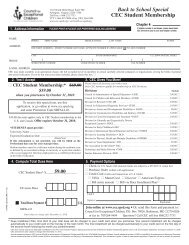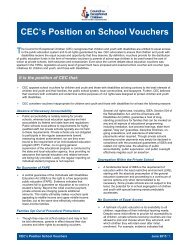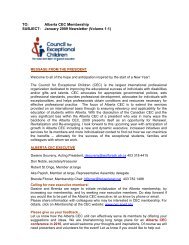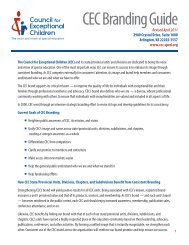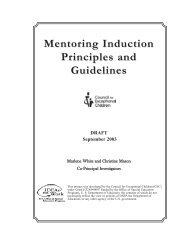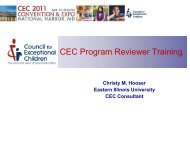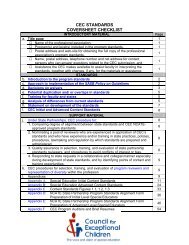What Every Must Know Special Educator - Council for Exceptional ...
What Every Must Know Special Educator - Council for Exceptional ...
What Every Must Know Special Educator - Council for Exceptional ...
Create successful ePaper yourself
Turn your PDF publications into a flip-book with our unique Google optimized e-Paper software.
d. Joint planning, coordination, and shared<br />
responsibility among special education, migrant<br />
education, bilingual education, and related<br />
programs.<br />
e. Funding patterns that adjust <strong>for</strong> variations in<br />
enrollment.<br />
f. Flexible scheduling and other programming<br />
options that adjust <strong>for</strong> student mobility.<br />
g. Routine monitoring of activities undertaken to<br />
identify the migrant exceptional student and to<br />
ensure educational continuity.<br />
h. Ongoing research ef<strong>for</strong>ts to promote, improve,<br />
support, and evaluate the education of migrant<br />
students with exceptionalities.<br />
i. Personnel training.<br />
j. Parent and family in<strong>for</strong>mation programs to<br />
facilitate record transfer.<br />
Paragraph 12 - Children with<br />
<strong>Exceptional</strong>ities in Charter Schools<br />
CEC vigorously supports educational re<strong>for</strong>ms within<br />
the public schools which promote rigorous learning<br />
standards, strong educational outcomes, shared decision<br />
making, diverse educational offerings, and the<br />
removal of unnecessary administrative requirements.<br />
Charter schools, a <strong>for</strong>m of public schools, are one<br />
approach many believe can be effective in achieving<br />
these objectives. However, such schools must reflect<br />
this country’s commitment to free and universal public<br />
education, with equality of educational opportunity<br />
<strong>for</strong> all including students with disabilities.<br />
Regardless of who takes responsibility <strong>for</strong> the delivery<br />
of educational services <strong>for</strong> children with disabilities<br />
who attend a charter school, the chartering agency<br />
– and, ultimately, state or provincial authorities -- must<br />
ensure that the rights of children with exceptionalities<br />
are upheld. It is the position of CEC that the following<br />
criteria with respect to children with disabilities be<br />
adhered to when parents, professionals, and school<br />
district authorities consider the development of charter<br />
school policy, the content of contracts or agreements<br />
establishing individual charter schools, and the actual<br />
operation of charter schools.<br />
Student Access. Charter schools must be<br />
required to abide by the same federal or<br />
provincial nondiscrimination and equal<br />
education opportunity laws that apply to<br />
other public schools. Charter schools must<br />
not discriminate in their admissions policies,<br />
nor should they charge tuition or other<br />
mandatory fees. Disability status cannot be<br />
used as a criterion <strong>for</strong> excluding a child with a<br />
disability from attending a charter school, and<br />
policies governing admissions and students’<br />
participation in the school program should<br />
not inadvertently exclude children with<br />
disabilities.<br />
Provision of Free, Appropriate Public<br />
Education. As public schools, charter<br />
schools must be required to provide a free,<br />
appropriate, public education to students<br />
with disabilities, and to ensure all of the<br />
other basic fundamental procedural rights<br />
in accordance with applicable federal and<br />
provincial laws, such as the Individuals with<br />
Disabilities Education Act and Section 504 of<br />
the Rehabilitation Act in the United States,<br />
including children’s physical access to the<br />
education program offered. Enrollment in<br />
a charter school cannot be used to deny to a<br />
student with disabilities the free, appropriate<br />
education to which they have a right.<br />
Financing the Education of Children with<br />
Disabilities. Educational and other services<br />
required by children with disabilities, including<br />
special education and related services, can be<br />
provided directly by the charter school, or<br />
through alternative arrangements with other<br />
public schools, with local school districts, or<br />
with state or provincial education agencies.<br />
State, provincial and local policies <strong>for</strong> charter<br />
schools and, when appropriate, charter<br />
agreements themselves should explicitly<br />
identify responsibility <strong>for</strong> providing and<br />
paying <strong>for</strong> any special services associated<br />
with educating children with disabilities in<br />
charter schools, including the cost of building<br />
renovations and the provision of education<br />
and related services.<br />
Accountability. Charter schools must be held<br />
accountable by state or provincial education<br />
agencies and, when appropriate local school<br />
districts, <strong>for</strong> providing special education and<br />
related services to children with disabilities,<br />
consistent with applicable federal, provincial<br />
and state laws, just as other public schools<br />
are. The standards that apply to educating<br />
Appendix 9: CeC profeSSionAl poliCieS 251



